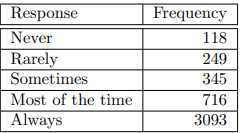Navigation » List of Schools, Subjects, and Courses » Math 136 – Introduction to Statistics » Quizzes » Quiz 6
No Answers We dont have answer to this question yet. If you need help with your homework send us an email  or chat with our tutors
or chat with our tutors
Quiz 6
Quiz 6
1. Problem 1. In a national survey conducted by the Centers for Disease Control to determine college students’ health-risk behaviors, students were asked, “How often do you wear a seatbelt when driving a car?” The responses are below.

(a) (2 points) What is the probability that a randomly selected driver wears a seatbelt most of the time?
(b) (2 points) Is it unusual for a college student to never wear a seatbelt when driving a car? Why?
2. Problem 2. (2 points) According to the Centers for Disease Control, the probability that a randomly selected individual has hearing problems is 0.151. The probability that a randomly selected individual has vision problems is 0.093. Is it true that the probability a randomly selected individual has hearing or vision problems is 0.151 + 0.093 = 0.244? Explain.
3. Problem 3. A social worker collected the following information about the employment status of married couples and the number of children the couples have.

(a) (2 points) Find the probability that a married couple has one child.
(b) (2 points) Find the probability that a married couple has no children and only the husband is employed.
(c) (2 points) Find the probability that a married couple has no children or both spouses are employed.
4. Problem 4. The ELISA is a test to determine whether the HIV antibody is present. The test is 99.6% effective, which means that the test will come back negative if the HIV antibody is not present 99.6% of the time. Suppose that the ELISA is given to 200 randomly selected people who do not have the HIV antibody.
(a) (2 points) What is the probability that the test comes back negative for all 200 people?
(b) (2 points) What is the probability that the test comes back positive for at least one of the 200 people?
 or chat with our tutors
or chat with our tutors
